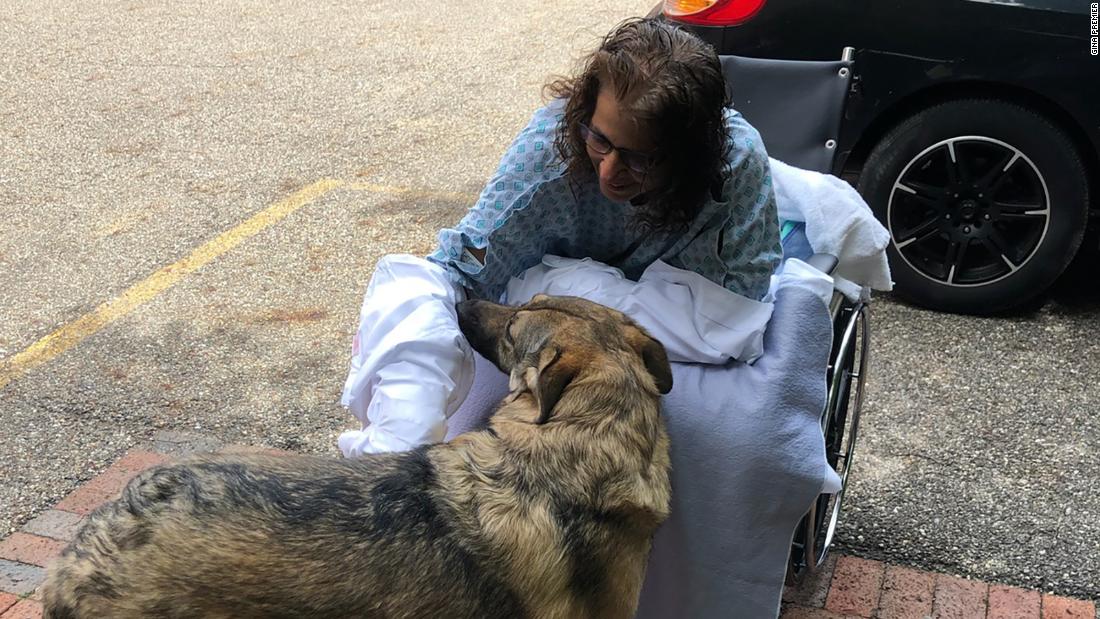[ad_1]
When Trainer woke in a hospital bed nine days later, her hands and legs had been amputated.
It took doctors seven days to discover Trainer incurred a severe infection, not from a “tropical” travel disease as they first suspected, but from her German shepherd’s kisses.
Trainer contracted a rare infection from the bacteria capnocytophaga canimorsus, probably when her German shepherd puppy, Taylor, licked an open cut.
Dr. Margaret Kobe, the medical director of infectious disease at Aultman Hospital in Canton, Ohio, treated Trainer and described her as “delirious” when she entered the intensive care unit. Shortly after, she became unconscious. Her skin started changing rapidly to a purplish-red color, and then it progressed into gangrene. Trainer then developed a blood clot.
“It was difficult to identify, We’re kind of the detectives. We went through all these diagnoses until we could narrow things down,” Kobe said.
The infection spread to the tip of her nose, ears, legs and face. “She didn’t lose parts of her face. But her extremities is what she had to have surgery on,” Kobe said.
The family sought a second opinion, hoping to save Trainer’s limbs. But doctors said the damage had already been done. Blood tests and cultures confirmed the diagnosis of capnocytophaga.
“That was a pretty hard pill for us to all swallow, to say she was fine a couple days ago on vacation and now she’s actively getting worse by the minute and now her hands and feet aren’t alive, like this doesn’t happen, it’s 2019,” said Gina Premier, Trainer’s step-daughter and a nurse at Aultman Hospital.
Trainer has had eight surgeries so far and is working with doctors to be fitted for prostheses.
“This is off the scale, one of the worst cases we have seen in terms of how ill people become with infections,” Kobe said. “She was close to death.”
A rare cause of illness in humans
Most people in contact with dogs and cats don’t get sick, and it’s rare for Capnocytophaga to cause illness in humans. Those at greatest risk are people with weakened immune systems, such as cancer patients and people who have had their spleens removed, the CDC said.
Those who become ill may show symptoms within three to five days, although some may show signs earlier or later, the CDC says. In rare cases, patients can develop sepsis. About 3 in 10 people who develop a severe infection die, CDC statistics show.
Capnocytophaga have been detected in up to 74% of dogs, according to the CDC. Animals can be tested for it, but those results can change, according to the CDC.
‘I’m so ready to move forward’
Marie and Matthew Trainer have two dogs and she says she has no intention of parting with them.
She asked her doctors if she could see her dogs again during her healing process. The pups have come to Aultman Hospital twice to visit.
“They brought them here two times at the hospital so I can see them and that just put the biggest smile on my face,” she said.
“I cannot believe how everybody has come forward to help and even people I don’t know from other states, and it’s unbelievable the people that have come out to help. I just don’t know how to thank them all,” Marie Trainer said.
She hopes to attend the next fundraising event on August 31, a motorcycle poker run and dinner sponsored by friends from another local restaurant.
She attributes her strength to the support of her family “It’s been such a hard road to travel down, I wouldn’t know what I’d do without them,” Trainer said.
Trainer will soon move from the hospital to a rehabilitation facility to learn how to use prostheses. She’s been fitted for prosthetic legs and will eventually get prosthetic wrists and hands.
“I’ve been feeling very good, they’re healing very well,” Trainer said. “I’m so ready to move forward. I want to go home, I want to go back to work.”
CNN’s Tatyana Bellamy-Walker and Michael Nedelman contributed to this report.
[ad_2]
Source link




